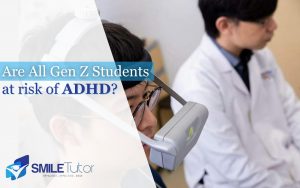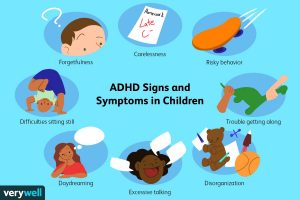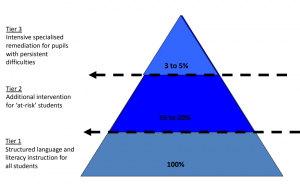
Look. We’ve been through the same rodeo about kids being kids.
They’re hyperactive, sensitive and always never seem to run out of energy. Catch a handful of them playing, and you can see the trouble that they can and often cause.
That period when your children are all actively getting ourselves in all sorts of situations were a result of their developing minds. When it’s fully matured, they begin to slow down and move at a more controlled pace in their daily lives.
The problem comes when this “itch to move around” becomes a disguise for a bigger problem. Yes, we’re talking about the attention deficit hyperactivity disorder (ADHD).
With the growing, or should we say, decreasing attention span of the average person in recent years, we can reasonably attribute a correlation with ADHD hidden amidst the younger generation of children, namely Gen Z students.
Thus, it is not strange to find a question that challenges this stereotype: “Are all Gen Z students at risk of ADHD?”. Is there truth in such a claim? Let’s find out!
Understanding ADHD

[Freepik]
So what’s up with ADHD? Maybe you’ve heard this term thrown around, but basically, ADHD describes a deficiency in staying attentive.
Some of its common symptoms include hyperactivity, impulsivity, and inattention. It is a proper medical diagnosis that afflicts many youths around the world today.
It is said that today, Singaporean children have up to a 16% chance of being diagnosed with ADHD. That’s a concerning percentage of them! And in 2010, the Singapore Burden of Disease Study in 2010 found that ADHD was the fourth highest contributor of disease burden!
Why Should You Check & Be Aware of ADHD?

[Freepik]
Why should you be concerned? Well here’s a serious one. Mental health! Your children born in modern times aren’t infallible to the pressure created socially and emotionally. People generally frown upon hearing that your children have ADHD.
“Oh, so you’re just lazy and stupid!”
“ADHD is not real, you’re just overthinking.”
Your children will hear these often. Stigmatisation, pushing blame, and preconceived biases can make them feel unwelcome. They’re not understood and accepted for what they’re going through. This can cause your children to close up even more for fear of further humiliation, despite their ‘outgoing’ selves that ADHD usually portray.
Recognising the Problem: Struggles for Gen Z Students

[Freepik]
We all know that those with ADHD do cope with several deficiencies throughout their lives. But here’s something new for you!
A correlation between Generation Z (those born between 1997 and 2012) and diagnosis for ADHD do appear to have surfaced in recent years. Citing Dr Ganesh, a consultant at the Institute of Mental Health (IMH), “symptoms typically begin before the age of 12”. And for these Gen Z students, it is also about the age range where they begin to be more active with their digital lives.
Not knowing life without the internet, Gen Zers are the most digitally savvy and diversified generation. Through social media, our children have sped up the shift in linguistic trends.
With this comes a bigger load of related psychological concerns compared to the previous generations!
More Distractions!

[Freepik]
For one, your child definitely enjoys their time in an era of constant connectivity and digital stimuli. This is especially harmful as it creates a synergy between their condition and their short attention span.
They’ll marathon through videos of movie summaries, commentaries of their video games, and reactions of their favourite internet personalities. They’ll engage themselves online, ignoring the dishes, taking a shower, or even doing their homework!
You should begin to worry when you see their increasingly terrible hygiene, lack of sleep and slipping grades. Research has found that elevated use of social media can contribute to ADHD symptoms!
For the Parents: Ways to Spot ADHD Symptoms

[Verywell Health]
Signs of ADHD can come and go. As a parent of a Gen Z kid, you should be proactive in identifying problems in its early stages
We know that these young’ins like to be left alone, but it should be done so the risk of ADHD is handled early, and an accurate diagnosis and treatment is given.
Don’t know how to start? Here are some ways to rat out the dirty laundry! If you’ve got a few strikes on this checklist, it may be time to have your Gen Z kid undergo a proper test for diagnosis!
Impatience: ADHD patients perceive things REALLY QUICKLY. The slightest of sounds distracts them, and the compulsions that come from staying idle will never allow them to sit through a book comfortably.
Have them do the chores for a start. Repetitive tasks can like hanging the clothes, mopping the floor or making them wash the plates after dinner. Unless they’re intentionally being difficult and defiant, this activity will serve as a measure if your child can follow through on tasks or not.
Forgetfulness: Do they often misplace things, or mark dates wrongly for appointments all the time? Start recording the frequency of these happenings! It’s one thing to be forgetful, but another when it happens ALL THE TIME.
Tardiness: If your child always seems bad with their time, or even finds trouble with activities that involve organising things, that’s another sign!
Hyperactivity: Watch for excessive fidgeting, restlessness, and difficulty staying still, especially in situations where it’s expected, such as during quiet time or structured activities.
Impulsivity: Do you find your child often acting without thinking, interrupting conversations, have difficulty waiting their turn, and struggle with impulse control? That’s another strike.
Academic Challenged: Keep up to date with your child’s studies by communicating with their teachers! Notice if your child has consistent difficulties in school, such as completing assignments, following instructions, or staying on task. Their grades naturally get worse from these little things as attention, focus and organisation are all factors that can influence your child’s academic success.
Socially Insensitive: Look for challenges in social situations, such as difficulty playing cooperatively, interrupting others, or struggling to take turns.
Seeking Support: Our Community Against ADHD
If you think your child may be at risk, or really just wish to learn and understand more on the topic of ADHD down to a science, you can check out parent support groups like the Society for the Promotion of ADHD Research and Knowledge (SPARK).
Since 2014, ADHD has been properly recognised and addressed by the government, allowing us to have a clearer action plan towards steps for recovery or coping by. For instance, take the “tier system” as described for the response to a school’s intervention approach.

The document articulates that “ A diagnosis of ADHD on its own does not imply that a child has comorbid learning difficulties or disorders”, and that schools will pay attention to the child in learning or school context so as to administer assistance and consultation with educational professionals appropriately.
What this means is that you can rest a little more assuredly! Teachers today are definitely made more aware of the affliction of ADHD, and will step in to help as soon as they recognise these problems in their students.
School Considerations for ADHD Students

When ADHD is deemed to be affecting the student’s ability to learn and work significantly, your child will be relieved with considerations like extended time for tests, preferential seating, and additional learning support, among others.
A Faster-Moving Society

[Freepik]
In an era defined by rapid technological advancements, constant digital connectivity, and evolving social dynamics, Gen Z students face unique challenges. The impact of this faster-moving society on attention span and mental health raises important questions about the potential risk of ADHD among Gen Zers.
Knowing if it’s there or not, can make all the difference when it comes to your child’s future!
